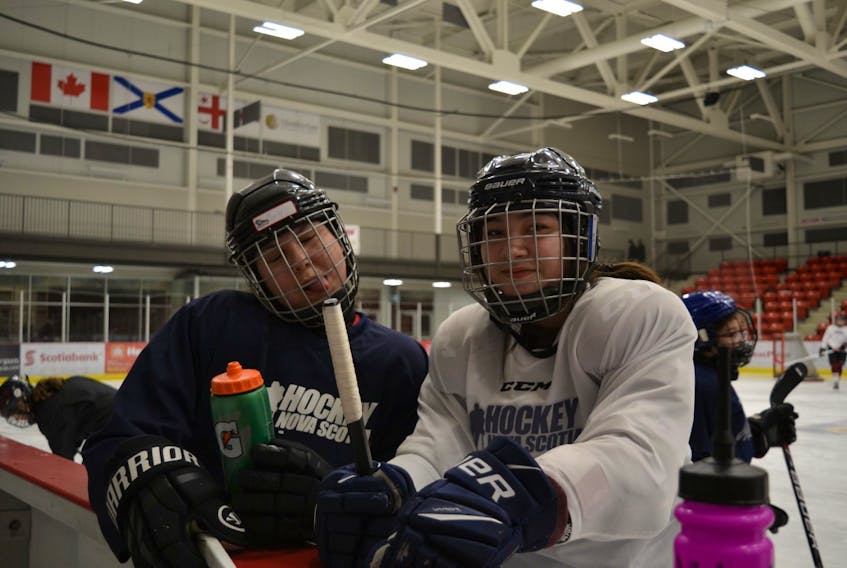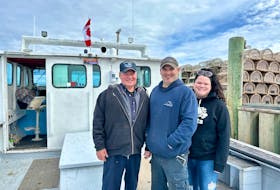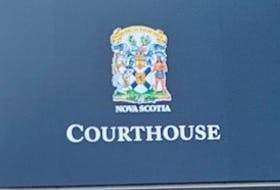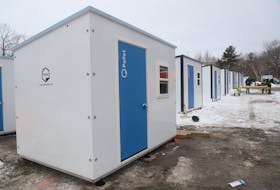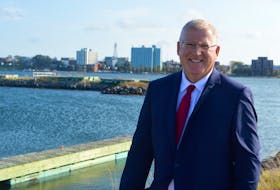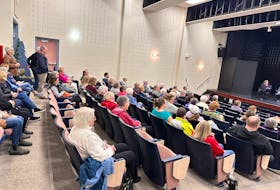MEMBERTOU — Kyrah Haddad is all smiles as she leaves the ice in a group of red-cheeked girls, all laughing and yelling.
She’s finishing up her third practice as part of the Female Indigenous Hockey program at the Membertou Sport and Wellness Centre. It’s the second year of the two-year pilot program by Hockey Nova Scotia with funding from the provincial government in an effort to bring more diversity to the sport.
Kyrah’s mother, Jamie Best, is a proud hockey mom and, due to provincial COVID-19 regulations, hasn’t been able to watch her daughter on the ice until now.
“This is their third week and this time the parents and families were actually allowed to come see her, which was awesome,” she said.
“They’re doing amazing. She loves the girls, she loves that it’s all girls actually. It’s such a good program for them. I love it.”

The Nova Scotia government tightened up COVID-19 restrictions before Christmas allowing just 25 people including players and coaches on the ice at a time and no spectators.
RESTRICTIONS EASED
The restrictions have since changed, and as of Feb. 8, a limited number of spectators are allowed in the rink with six feet of physical distance and masks at all times.
Krista Hodder is the Mi’kmaq physical leadership co-ordinator in Membertou, the community organization that delivers the program. She says she chose to keep the program small this year with only 20 spots because of the uncertainty of COVID-19 cases and ever-changing restrictions.
In addition to the space limitations, she says not having parents allowed into the rink was a real hindrance.
“That caused a little bit of hesitation for the young girls to come to the ice. You know, you have that comfort with your mom or your parent to come in and by saying we need to leave you at the door and somebody else has to take over and tie your skates that was kind of off-putting for some.”
It’s another barrier to entry for these young Indigenous girls to get involved in the sport. Hockey Nova Scotia has acknowledged the widespread problem of racism and discrimination at all levels of hockey.
The organization formed a Diversity and Inclusion Task Force in December 2019 after a number of local and international incidents involving discrimination including a Midget ‘A’ game in Cheticamp in which Logan Prosper, an Indigenous player from Whycocomagh, faced racial slurs from the opposing team.
Dean Smith is the chair of the task force and points to this program as an example of proactive solutions to the diversity problem in hockey.
BUILDING DIVERSITY
“Hockey has never been a welcoming sport for many players of colour, has never been a very welcoming sport for members of the 2SLGBTQ+ community or persons with disabilities for that matter,” he says. “So building diversity in the game, we hope, will just foster more and more players from underrepresented groups to join.”
Close to 50 Indigenous girls between six and 14 are taking part in the program between the two Cape Breton locations, Membertou and Eskasoni. Due to the provincial restrictions, that’s down from 90 participants last year.
The program is free of charge and hockey gear is included for those girls that wouldn’t be able to participate without it. In Membertou, that’s 15 of the 20 registered.
The 10-week program is open to all skill levels and Hodder says about a quarter of the girls are new to hockey. Some are just learning to skate and for others it’s their first time playing with a stick and a puck.
She says the full female roster including young Indigenous coaches helps to make the girls feel comfortable.
“This is a safe space for young Indigenous females to come out and get on the ice and without having to worry about the stigma that might be attached to their gender and their cultural identity.”
BACK ON THE ICE
Ten-year-old Ava Prosper travels over an hour to Membertou from her home community of We'koqma’q for the weekly practices. She comes from a hockey family.
“I think pretty much all of my cousins play hockey,” she says.
She played too when she was younger but quit for a few years. This program helped get her back on the ice.
“The people are really nice and I like the drills we do.”
She’s learning a lot and says she definitely plans to stick with it and has her eye on the Baddeck Bobcats minor hockey team.
Despite the challenges the pandemic has caused, Hodder is pleased with how the program is going so far and says the bright side is that the smaller group has allowed them to get to know the girls more intimately and focus on their individual skills more.
As for Haddad, her mom can see the passion she’s developing and sees a lot of hockey in her future.
“She’s talking about the (Cape Breton) Blizzard. She’s talking about playing with everyone now, so she’s in it to win it for sure.”
-30-

